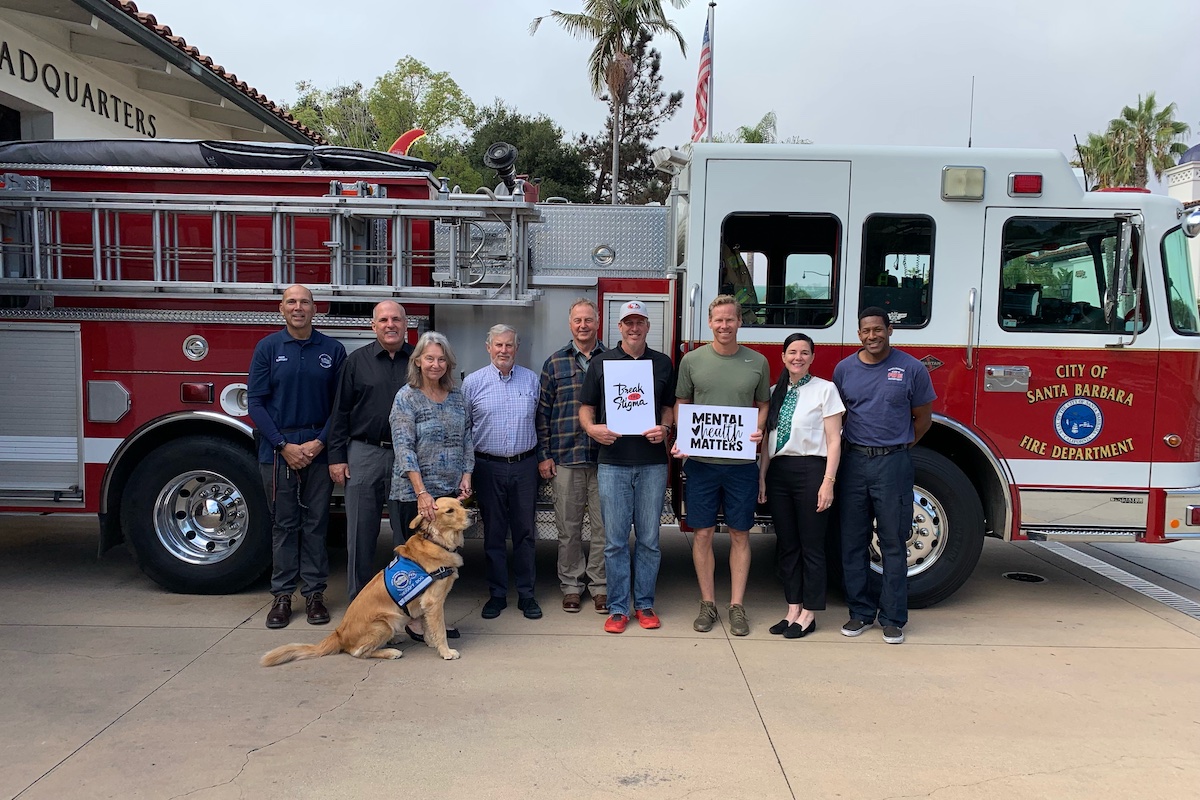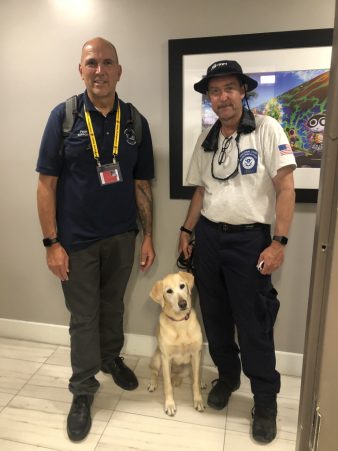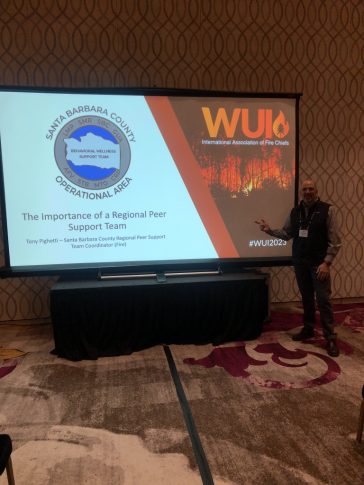Santa Barbara’s One805 | Taking Care of the People Who Take Care of Us
Nonprofit Provides Mental Health Support for First Responders

Nationwide, the alarm bell has been sounding for firefighters for a long time — not just to come to the physical aid and rescue of civilians, but to come to the mental health aid and rescue of themselves. Founded on the idea that peer support is the best bridge to get firefighters to seek treatment when they need it, the Operational Area Fire Department Peer Teams in Santa Barbara County are successfully working to provide that aid, thanks in large part to the financial support of One805.

Originally created to help the community heal in the aftermath of the Thomas fire and subsequent mudslides, One805 is now a full-fledged nonprofit working to assist local first responders in a variety of ways, including a big commitment to ongoing support for mental health. Recent donations from Direct Relief and Yardi Systems specifically to support this program — respectively to the tune of $150,000 and $100,000 — are one nod to its effectiveness.
“When it works, it’s almost magical to watch,” said Tony Pighetti of the peer-led program that’s become his passion. A retired firefighter who grew up in town and served 30 years in the City of Santa Barbara Fire Department, Pighetti is currently the Regional Coordinator for the county’s Operational Area Fire Department Peer Teams, which encompass eight different agencies and jurisdictions. His role is primarily as a facilitator. “I will go out and do some of the legwork or engage in deployments, but typically I like to see that the active firefighters get the experience and be involved.” There are currently nine people coordinating the peer program and about 100 trained peer support team members, “that’s out of 722 firefighters in the county,” a statistic he is justifiably proud of. The goal was to have 10 percent trained, which they’ve more than surpassed.
How the program actually works, Pighetti explained, “our traumatic stress isn’t quite like the military traumatic stress; our stress is more cumulative.” In the course of 5-7 years, a firefighter may go out on 100 calls, and there may be a few that “you’re still seeing in your head like it was yesterday. And eventually you get one too many, and then it just takes over. Someone will call and say, ‘I’ve never had nightmares before. And all of a sudden, now I’m having nightmares. Am I going crazy?’ So that would be someone reaching out to the team.”

The peer teams also keep a close watch on the call list, particularly if there’s a multiple vehicle accident or anything involving the death of a child or any kind of a death that’s out the ordinary — things that might trigger trauma. Dispatch keeps an eye out too, he explained. Sometimes they’ll get a text with a heads up so they can check in on the team that had a particularly difficult night — preferably before they end their shifts.
Or an individual firefighter will be concerned about someone else. In any case, the person in potential trouble would have a peer assigned to check in with them. That person reaches out with a simple call, “Hey, someone called me so they’re really worried are you okay? And typically, the first call may be that I’m fine,” said Pighetti. “We don’t push it; we just say it’s someone who’s concerned. You say you’re okay, I take your word for it. If you ever need anything, please call me back. And if you don’t mind, I’m gonna call you in about a week or so just to check in just for our peace of mind.”
And they follow up, sometimes multiple times. “We don’t confront, we just encourage. And usually it takes a few weeks, but once it does, man, it works,” said Pighetti. “Once those doors open, then we’re off to the races, and the floodgates open the emotions. And at that point, our first concern is that we figure out what resources are needed. … there’s so many different things that we can help them or guide them to a professional, whether it’s a doctor, a psychologist, or some sort of health group.”
That professional help is fully funded by One805, and it’s completely anonymous, which Pighetti explained is particularly important to the effectiveness of the program and the firefighters’ willingness to use it.
“Even though we’re doing this on a grand scale, it’s still done one firefighter at a time. And every firefighter is treated differently based on what their challenges are,” he said.
“We don’t offer any advice. We don’t diagnose, all we do is we take in the information. And then we’ll listen. We made sure the individual is safe, and then we refer. Where One805 comes in is we needed a pool of clinicians, that would be on call, and that would take our calls 24/7.”
He continued, “There’s no way to sugarcoat it, let’s say someone says that they’ve been thinking about suicide. … How do you prepare a peer? Probably someone they know the spouse, know the kids. How does that individual ask the question? Are you thinking of suicide? When you already know the answer is ‘yes’. If you’re gonna reach out to somebody, do you think you have a drinking problem? Do you think you have a depression problem? Do you think you have a problem controlling your anger? Are you suicidal? The answer is ‘yes’, we already know that, or we wouldn’t be asking the question. So how do you gain the confidence to ask that question? And be ready for the ‘yes’. The way to do that is to have professional support, one phone call, one text, one email away. And that’s what One805 does. One805provides that support.”
He added, “What we’re trying to do is remove all the excuses. If someone says, ‘I’m not calling a clinician, my supervisors are gonna find out.’ … Your supervisors are not going to find out because this is run through a nonprofit and your supervisor gets absolutely zero reports. ‘I don’t have the money to pay for it.’ Okay, we figured that out for you, too. We’re using community dollars to pay for this. So you don’t have to pay. ‘I saw a clinician list, but they didn’t know what I did for work. They don’t understand my shift schedule, they don’t understand the trauma that I see.’ So we can say, we fixed that, we have a list of culturally competent clinicians that we embedded that understand exactly your schedule, they understand the rank service, they understand the call load, they understand the mandates, they understand the home life and the home work balance. Right there. We’ve eliminated the excuses.”
“It’s really amazing how effectively it works,” he said. “By the third session, they’re like, ‘I should have called three years ago.’ So that’s the beauty of One805. It gives the peer team the strength to do what they do. And then it gives the confidentiality of the program for someone to make that call, and not ever think that their supervisors are gonna find out.”
For more information, see one805.org.

One805LIVE! is coming on September 22 with an amazing benefit concert for our Santa Barbara County first responders, headlined by Maroon 5, who is donating 100 percent of their performance to the cause, with more performers to be announced soon. Not only that, the Grammy–winning band will join the party at Kevin Costner’s oceanside estate in Summerland. Tickets are available at one805.ticketspice.com/one805live2023



You must be logged in to post a comment.